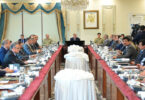F.P. Report
Islamabad: The Senate Committee on Human Rights on Thursday, called for a holistic legislation for rehabilitation of Pakistani internees in Guantanamo Bay like prisons and tasked the National Commission on Human Rights and Law and Foreign Affairs ministries to prepare draft legislation.
The call came during discussion on payment of compensation to Pakistani nationals recently released from the Bagram prison in Afghanistan. The representatives of Foreign and other Ministries contended that there was no law to address the issue.
The meeting presided over by Chairperson Nasreen Jalil was attended by Senators Nisar Muhammad Khan, Sitara Ayaz,Sehar Kamran, Samina Abid, Jehanzeb Jamaldini and Farhatullah Babar besides Chairman of NCHR, officials of the Law division, ministry of Human rights, Foreign Affairs and others.
Pleading for compensation and rehabilitation of the prisoners in Bagram prison Senator Farhatullah Babar said that there were many more similarly ill fated prisoners in Guantanamo Bay who were handed over during Musharraf days without due process and about whom nothing is known.
He quoted from General Musharraf biography that his government had captured 689 militants and handed over 369 to the CIA without trial for bounties totaling millions of dollars. Intriguingly this confession was deleted from the Urdu translation of “In the Line of Fire” he said.
Fifteen years down the line we ought to know who were these unfortunate 369 people, what was their crime, where were they taken, whether any trial was conducted and where are they now, he said. We owe it to all those innocent who were wrongly incarcerated in Guantanamo Bay or in Bagram or in other such centres he said.
He said that providing justice to them called for holistic legislation. The Parliament will be failing in its duty if did not raise voice for rule of law, due process and compensation to these unfortunate people, he said.
Talking to the media Senator Farhatullah Babar said that after the promulgation with back dated effect from 2008 of the Action in Aid of Civil Power Regulation 2011, several dozen internment centres were set up in different parts of the country.
The Regulation was given back dated effect to encourage the law enforcing agencies bring into the open those caught during fight against militancy in Swat and Malakand to stand open trial. However, these internment centres had overtime turned into Pakistani Guantanamo Bay prisons and virtual black holes from which no information was forthcoming, he said.
The Committee also discussed the issue of how to prevent misuse of the blasphemy law. Members were of the view that while no change in the law was contemplated, it was necessary to devise ways and means to prevent its misuse.
It decided to make a brief on the recommendations made by the Ministry of Religious Affairs, the Council of Islamic Ideology and the recent IHC judgment in a blasphemy case and seek the views of all provincial government and stake holders on it within a specified time frame.
The Committee was informed that the Council of Islamic Ideology has also proposed in its report 2000-01 and 2003-04 that the offender who registers a false case under 295 (C ) should be given the same punishment as provided to the offender of blasphemy. In its report in 1997-98 the Council also recommended that the complainant who lodges a complaint under 295 ( C) be required to produce two witnesses in support of his accusation. Ministry of religious Affairs has also said that while substantive amendment is not permissible procedural amendments be made to prevent misuse of the law.
The Chairman NCHR proposed that no officer below the rank of a Superintendent of Police shall investigate the offence under section 295 C of PPC.
The amendment in the National Commission on the Status of Women Act 2012 passed by the National Assembly was however not passed by the Committee which sought more time to deliberate on the issue.
Senator Farhatullah Babar said that an legislation to force the government to appoint a new Chairperson after the incumbent had ceased to perform her functions was of no use as Article 254 of the Constitution clearly stated that if anything required to be done in specific time was not done during that time shall not be invalid for the reason only that it was not done within that period.
He proposed to adopt the model of Wafaqi Mohtasib which provides for the incumbent Mohtasib to continue till the appointment of a new one. the Committee however deferred the issue.






